“White people! White people! White people!”
“Why am I angry?”
“Why don’t I wanna deal with white women no more…?”
“I am angry because they act like I don’t exist…”
“That’s not my truth…”
“You won’t even acknowledge me…”
“You say you love me, but when you come to me, everything you tell me is about how frail I am and how weak I am…”
“If it was a man… that’s foundations for abuse and to continue to accept that…….”
“Some of the things being said sound… abusive…”
“Would you want to live with someone… would you want to be with someone, if they only saw your flaws?”
“If your only narrative that you can find moving forward has to do with ‘Black Maternal/Child Health and Mortality’… if you don’t find more that you can say… you ain’t my friend… I’m not gone play with you no more… ‘cause you don’t love me…”
“You say you think I’m great, but you don’t…”
“If you say you love me, don’t abuse me.”
“If you say you love me, I’m expecting to hear you talk about my greatness.”
“Just tell the truth.”
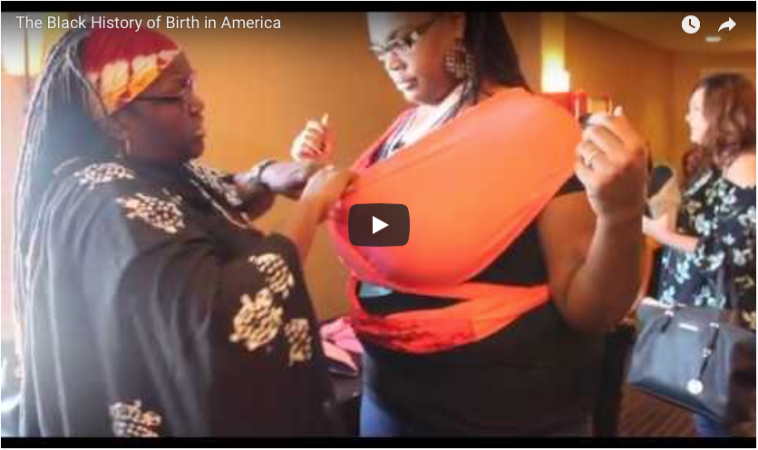 If you are surprised to see those phrases as the first words of my post, you are no more surprised than I was to hear the words coming out of my mouth as I watched the video from ProDoula’s “Speak Your Truth” Conference. “Why?” you may ask. Well, because (if you know me) then you know how measured I am with my words. If you know me then you would know that those frustrations I vocalized during the conference about birth culture in the U.S. are usually reserved for my closest and most intimate companions. And usually the only audience that I allow to hear my innermost TRUTH about these types of things or how I really feel are other Black people.
If you are surprised to see those phrases as the first words of my post, you are no more surprised than I was to hear the words coming out of my mouth as I watched the video from ProDoula’s “Speak Your Truth” Conference. “Why?” you may ask. Well, because (if you know me) then you know how measured I am with my words. If you know me then you would know that those frustrations I vocalized during the conference about birth culture in the U.S. are usually reserved for my closest and most intimate companions. And usually the only audience that I allow to hear my innermost TRUTH about these types of things or how I really feel are other Black people.
How appropriate that the conference was titled Speak Your Truth.
So here is another bit of TRUTH that I have only shared with my husband. (Not even Randy Patterson knows this.) When Randy first asked me to be the Keynote Speaker at the conference, I was hesitant. Again, you may ask. “Why?” Well, because I had vowed I would never talk about Black maternal and child mortality again. I had ZERO aspirations of talking about dying Black women and babies for an hour.
First of all, I know that there are scores of women of African descent that are championing efforts. They are constantly working to make sure that inequities and inequalities in birth culture that propagate negative outcomes for Black women and babies are addressed properly through legislation, the medical system and any other area needed. But I also noticed something else that has crept into birth culture.
What I noticed is that at first (as recently as five years ago) birth culture was fighting the use of language that specified African Americans’ challenges in birth, then SUDDENLY it became acceptable to speak about it as a major reason that birth culture needed to be overhauled. And SUDDENLY that was ALL the majority culture wanted to talk about when they talked about Black women. Our STRUGGLE had become normalized and accepted as OUR NARRATIVE and OUR TRUTH by many. That is only the smallest part of our story.
But I never told Randy all of that when she asked me to be the speaker. In fact, we chatted by Skype several times over the summer, before and after my volunteer birth work in the Dominican Republic.
I mentioned being hesitant earlier in this post, but I did not tell the full reason why I was cautious. The complete TRUTH was that I was concerned that there would be a point where ProDoula might request to know exactly what I planned to say during my Keynote.
I ran scenarios in my mind of what I would do or say if anyone demanded to know what I would be speaking about… None of the scenarios ended well. I can’t say I had a cause to be cautious about sharing it with Randy outside of my own personal baggage. So why was (is) that so important to me?
- Because I value my investment into my mind and my intellectual property is one of my most prized assets in life.
- Because my experience and history has shown that Black people do not always get credit for their work when they share it. (i.e. The Patent Office).
- Because I do not desire my thoughts and words to be censored.
- Because I know that my TRUTH requires some statements like those found at the beginning of this post.
- Because there was no way I was going to justify myself and my experiences at a Conference called ‘Speak Your Truth.’
This was all happening in the late Spring and early Summer of 2017 after statements had been made that were offensive to many African American birth workers about the topic of Black maternal and infant mortality. Some Black birth workers had decided to be DONE with white women in birth work and their organizations, especially those who proclaim Ina May Gaskin to be the ‘Mother of Midwifery’ and other white women as the originators of birth support in this country.
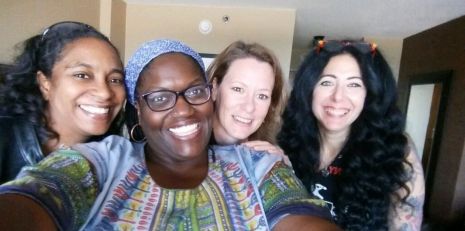
Randy never asked for specifics about my speech. And the fact that she didn’t ask made me even more nervous, because I knew as her friend that she was trusting me with something that is extremely precious to her: the membership of ProDoula.
As if that wasn’t enough, when I arrived at the ProDoula Conference, I was (literally) cornered by a few of the Black doulas. There were a couple who stared me in the eyes and said matter-of-factly, “You know YOU are the reason we are here, right?” “Ummm… huh, really?” was the best answer I could muster. They had no problem repeating what they had said and explaining themselves further. Another Black doula later said, “I am here to see if you are the REAL DEAL or if ProDoula just brought you here to get us to come.” Blink! BLINK!*
How was I to respond to that? These sisters had come with a certain expectation and NOW I was REALLY NERVOUS! How can one talk about Black women in birth without talking about the STUFF that is usually only reserved for family? When I asked them if they had my back, I meant it as a serious question. In retrospect, I believe I was able to speak TRUTH because of the energy I felt from those melanated women who had stood up front on that stage. I could feel them holding me up. I knew that they understood that for Black women, our TRUTH is not always welcomed, because it disrupts the fallacy of what many in the majority culture have been told is the TRUTH.
I have watched the video Erica created a few times now. I am finding myself referring to the speaker as “she” and “her” as opposed to “I” and “me”… It’s a little strange hearing myself say so much of my TRUTH so publically. I am still amazed that the ProDoula membership received me and my challenging message so well.
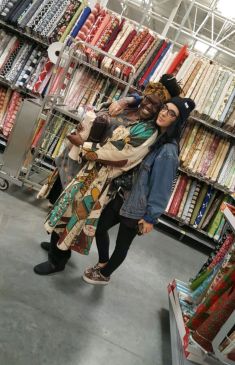
The other piece of OVERWHELMEDNESS occurred after I left the conference. Randy called me a week after the conference ended and told me that Erica would like to come for a visit to get some additional video of me. YIKES! Both Randy and I have stayed in each others homes before, so the visiting was not a huge deal. What was a MAJOR deal was that THERE WAS MORE that Erica wanted to film of my life. I wondered what she could possibly hope to see or observe in my everyday life that could enhance what I had spoken about at the conference?
I will be honest. I have worked with many people who have not had the capacity to retain messaging through the editing process. I had no idea what to expect from Erica’s work, even though I understood that my almost two hour message would need to be edited down to a manageable length.
I sat with my husband and watched the video. Afterwards we looked at each other and said, “She did it…” I cannot fully express how it feels to know that even through the editing process, Erica was able to preserve this very challenging and necessary message, so that it can be shared with a larger audience.
When Randy asked me to speak at the ProDoula Conference, she only made one request. She said (and I will paraphrase a bit) that she didn’t want the ProDoula members to simply hear a keynote speech, but that she wanted to provoke them to action once they left. She acknowledged ProDoula’s effectiveness in equipping individuals to build sustainable businesses, but she also said she wanted to mobilize them in a different way. She said, “I want them to feel something after they leave the ProDoula Conference and I believe you are able to make that happen.”
There are seldom times when organizations with non-Black leadership are willing to promote a message that is important to Black people without making an effort to censor it to make it palpable to a more mainstream audience. ProDoula has remained true to form and trail blazed along a different path.
The last message I received from Randy today said: “Let’s just get the message out there every and any way we can!”
Randy (because I know you will eventually read this post),
- For the confidence placed in me to SPEAK TRUTH to the ProDoula membership…
- For the honor you placed on the descendants of women of African descent who managed and maintained birth in this country for hundreds of years…
- For the investments you chose to make that allowed the message to be preserved…
- For the part you, Jerry and Erica played in helping share a message of TRUTH with a broader audience that may never have an opportunity to hear it…
I speak these blessings over you:
- May your businesses continue to grow and prosper.
- May your platform expand with each effort you make to leave birth better than you found it for all women.
- May you be granted the deepest desires of your heart as you seek the highest good for others.
ASÉ! (IT IS SO!)







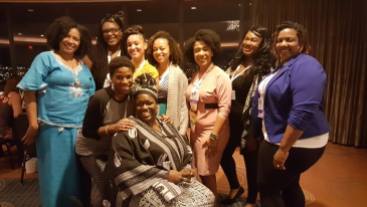






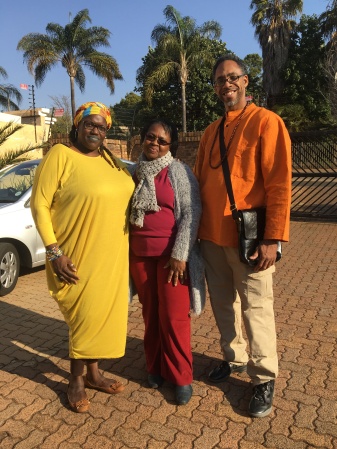
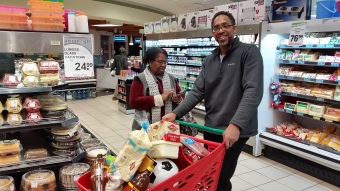

You must be logged in to post a comment.